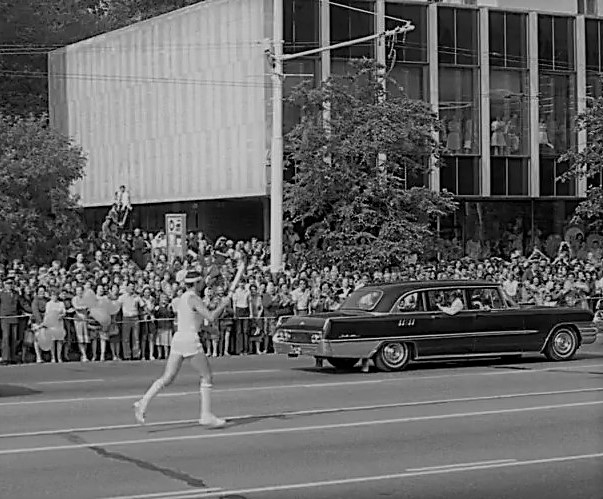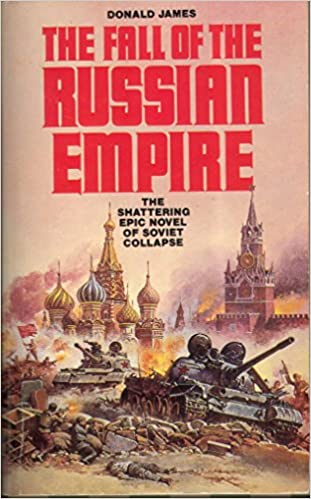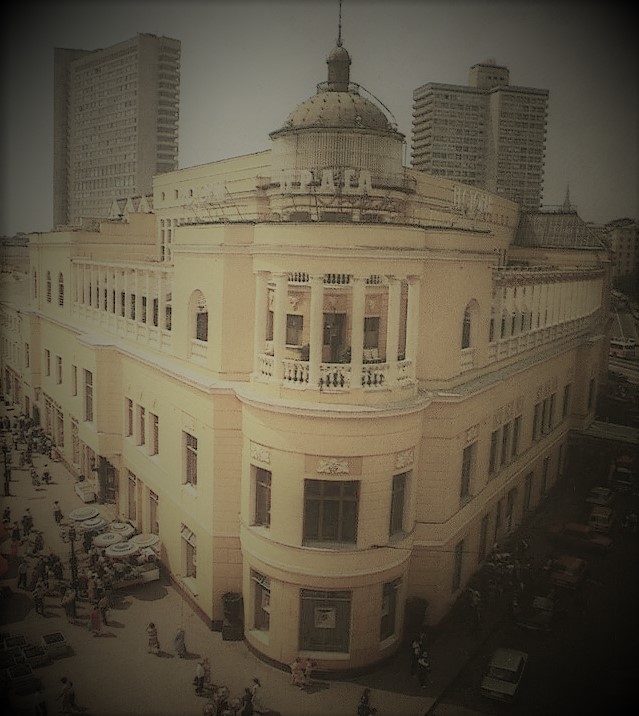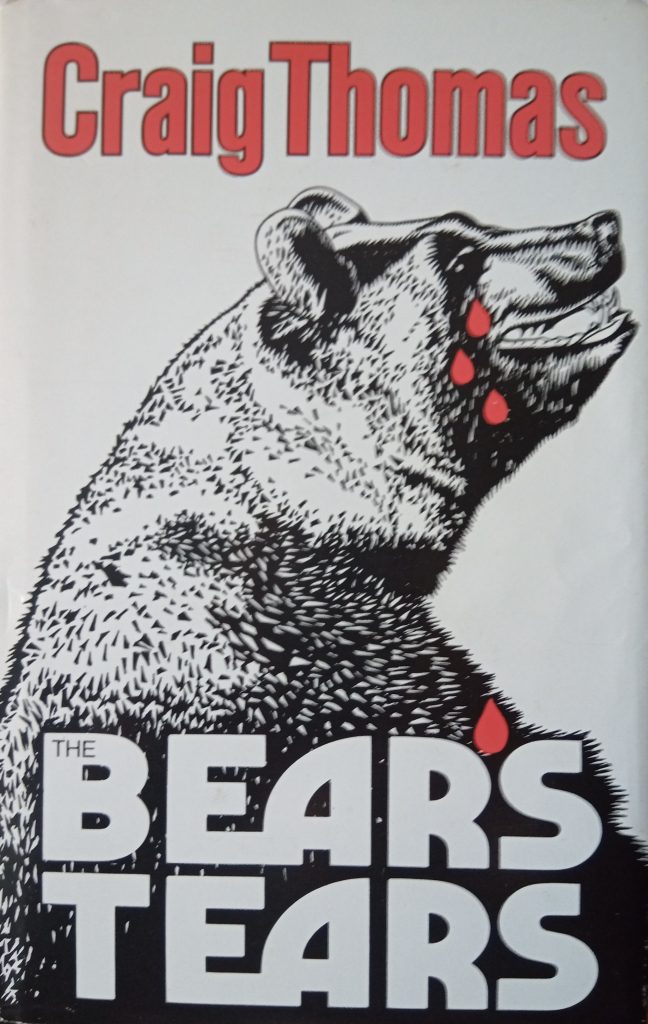
The Moscow Olympics of 1980 presented a setting for thriller writers that was too good to miss. Especially if they timed it right and got their book in the shops ahead of the Games.
Russia in Fiction has already reviewed one such book (John Salisbury’s 1980 novel Moscow Gold). David Grant beat Salisbury to the tape, with Moscow 5000 being published in 1979.
Well, we say David Grant. In reality, Moscow 5000’s author was renowned British thriller writer Craig Thomas (1942-2011), writing under a pseudonym. And the novel’s skilfully complex plot betrays that it is not written by a novice; with four strong and interlinked story lines coming to their conclusion in the running of the men’s 5000 metres final in the XXII Olympiad in Moscow’s Luzhniki Stadium in 1980.
From the Russia-in-fiction angle, two of these plot strands are notable; particularly so the Ukrainian nationalist one.
Story strand one in Moscow 5000 follows the fictional competitors in the Olympic 5000 metres for men right through to the final at novel’s end. Athletes from the USA, Britain, France, Australia, and Uganda are identified and given their own personal stories. One of the favourites from the West has his build-up disrupted when the Soviet authorities falsely accuse him of trading on the black market; David Grant deciding to go for the clichéd notion of this particular accusation involving the selling of several pairs of jeans.

Story two touches on a common Soviet Communism-in-fiction theme, as a female athlete seeks to use her relationship with an American in order to defect to the West. It is only not Russia-in-fiction territory because the character in question is a Polish pole vaulter.
Story lines three and four are firmly on the Russia-in-fiction track. The former being a straightforward ‘who is the spy?’ plot, as the Moscow Olympics are chosen as an ideal place for a senior Soviet official, spying for the United States, to deliver key information and then be smuggled out of the country. The latter, and dominant, story line represents the most interesting and original element of Moscow 5000, as a group of Ukrainian nationalists plan a terrorist atrocity that could wipe out thousands in the Olympic stadium as the 5000 metres final is run.
Whilst getting a book called Moscow 5000 out in the run-up to the Olympics might have made good marketing sense, events rather got in the way of several key plot elements. Not the least being that at the Moscow Olympic Games, in the real world, following the boycott prompted by the Soviet invasion of Afghanistan in December 1979, there were no American athletes —let alone the entourage of US officials and journalists that elements of Grant’s plot rely on.

Nonetheless, from the perspective of Russia in Fiction, there is much to interest and plenty to admire in Moscow 5000.
At the level of high politics and what Moscow 5000 tells us about perceptions of the Soviet Union by the early 1980s, the striking aspect is the inclusion of a strong plot line built on the notion that Ukrainian nationalism retained sufficient force to prompt violent action. Granting enough fictional licence to leave aside any overly serious discussion of the novel’s planned terrorist atrocity and its indiscriminate ferocity, that Western thriller writers noted and drew on such nationalist feeling in their plots is noteworthy.

And David Grant was not the only one —as, for example, Russia in Fiction’s review of Donald James’s The Fall of the Russian Empire (1982) will discuss when we eventually post it.
[Review of The Fall of the Russian Empire posted 9 September]
Only a decade on from the publication of Moscow 5000, such nationalism was the primary element that brought about the collapse of the Soviet Union —an event noted for taking experts in Soviet affairs by surprise.
More mundanely, Moscow 5000 does a sound enough job in its portrayal of Russia’s capital at that time; even if the occasional section has more in common with an information booklet than a novel.
The Lenin Stadium, Moscow, first site of a modern Olympiad to be in existence before the home of the Games had been decided. It had been built in 1955 and 1956, in the southern loop of the river Moskva where the marshy wastelands of Luzhniki —a name still given sometimes to the stadium, though not in Olympic year— were filled in and levelled, and planted with thousands of trees and laid with asphalt walks, all now widened and improved. The park complex extended over 175 hectares (432 acres), and included the main stadium with its 100,000 seating capacity, the covered Sports Palace, a competition swimming pool with room for 13,000 spectators, tennis courts, and the smaller stadium for 15,000 capacity.
Moscow 5000, p. 46

Western guests stay at the Inturist Hotel, are told the old story about Ivan the Terrible having the architect of St Basil’s blinded so that he could never create something so beautiful again, and traipse around the Kremlin as a guide takes them to the
Cathedral of the Archangel, Cathedral of the Annunciation, Cathedral of the Dormition, Cathedral of the Deposition of the Virgin’s Robe … Chapels, sacristies, Renaissance windows, altars, bishops’ stalls, frescoes, iconostases, and the tombs of the czars from Ivan Kalita to Peter the Great —all becoming a shimmering curtain of impressions, stirred by the breeze of his indifference.
Moscow 5000, p. 140

And as seems obligatory whenever any character in a novel based in Moscow goes out for a meal, particularly in the Soviet era, a key meeting is held in the ‘Café Praga on the Arbat’.
The Olympics press centre on Zubovsky Prospekt is name-checked, as is the chairman of the Olympics Organising Committee (‘Orgkom’), Ignatii Novikov.
Away from the Russia-in-fiction aspects, Moscow 5000 is an accomplished thriller that successfully takes the tension of all of its plot lines right up to the conclusion of the titular race. Although, unlike the other novel that Craig Thomas wrote under the pseudonym David Grant (Emerald Decision, 1980), Moscow 5000 does not appear to have been re-published under Thomas’s real name to capitalise on his success as a prolific thriller writer. (Although given that the rights to Thomas’s 18 novels fetched tens of thousands of pounds at auction earlier this year, perhaps that sale heralds a re-issuing of the back catalogue?)


Thomas’s best-known novel, Firefox (1977), was made into a film starring Clint Eastwood and featuring a fighter jet pursuit across the Soviet Union. But when it comes to Russia in fiction, it is his 1985 novel The Bear’s Tears that is Craig Thomas’s finest work. We may get round to reviewing it before we reach our 100th book target.